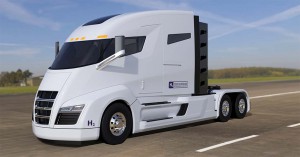The promise of fuel cells has intrigued carmakers for years because they promise to liberate the automotive business from the petroleum industry but expensive batteries needing rare minerals and complicated manufacturing processes.
But as the well-worn joke about fuel cells goes the breakthrough in fuel-cell technology always seems to be about 10 years in the future despite the best efforts by companies such Toyota, Honda, General Motors, Ford Motor Co. and Daimler AG among others.
However, the Bosch Group thinks that commercial vehicles, particularly heavy trucks that run long distances over fixed routes, could be ideal candidates. Not only can fuel cells easily fit into large Class 8 trucks in many cases, the users of big trucks can supply the hydrogen required to run the electricity generating fuel cells, according to Jason Roycht, vice president, North America Regional Business Leader.
Roycht noted Anheuser-Busch recently placed an order for 800 Class 8 trucks with Nikola, a fledgling truck maker with plans to build electric trucks.
(Freightliner takes aim at Tesla with two big EV semis and a new e-mobility center. Click Here for the story.)
At the heart of the Nikola truck line-up is a new commercial vehicle power train achieved thanks to a development partnership between Nikola and Bosch. The organizations re-imagined the powertrain from the ground up. Bosch’s eAxle expertise has enabled Nikola to move quickly on an aggressive path to bring its electric truck to market.
“Bosch is an incubator of electromobility solutions. No matter whether at established OEMs or start-ups, Bosch is accelerating development and helps achieve fast breakthroughs on the market,” said Markus Heyn, member of the Bosch board of management responsible for the Commercial Vehicle Organization.
“We have been aggressively pursuing our goal of bringing the most advanced semi-truck ever built to market,” said Nikola Founder and CEO Trevor Milton.
(Click Here for more about Tesla’s new semi truck.)
“The powertrain requires an innovative and flexible partner able to adapt quickly to the speed of our team. Bosch has empowered us to come to market quickly with automotive-grade hardware and software so our vision can become a reality,” Martin added.
The eAxle developed by Bosch is a scalable, modular platform with the motor, power electronics and transmission in one compact unit. This makes it suitable for vehicles of all kinds, from small passenger cars to light trucks. Nikola and Bosch will use this know-how to commercialize the world’s first true dual-motor commercial-vehicle eAxle for a long-haul truck.
By 2021, Nikola is planning bring to market the Nikola One and Two, a class 8 hydrogen-electric truck lineup that will deliver more than 1,000 horsepower and 2,000 ft. lbs. of torque – nearly double the horsepower of any semi-truck on the road – all with “zero local emissions,” as previously announced by Nikola.
(Why is Nikola Motors suing Tesla? Click Here to find out.)
Bosch is also collaborating with Nikola’s new power sports division, which is developing a line of electric-powered all-terrain vehicles that should be ready for market by late 2019, according to Michael Erickson, president, Nikola Powersports, who provided a look at the new vehicle during the Bosch Group’s Bosch Mobility Experience at the company’s test track in suburban Detroit.

